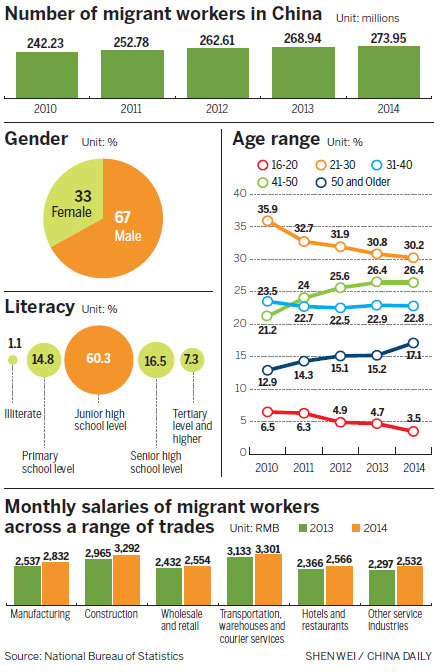
Moreover, many workers from rural areas don't even know how to work the farmland. Liang Dong, 32, said he had barely done any farm work before he left his village in Liupanshui in Guizhou province, at age 17. However, he wasn't sorry about that. "Farming is too tiring and the income is too low," he said.
Still, becoming a part of the city is equally hard.
Liang has lost count of the number of jobs he's had in the past 15 years, but none of them paid enough for him to settle down. He has lived and worked in a number of cities, and earned a living on construction sites, and as a waiter, factory worker, security guard and bookseller. He declined several offers to attend junior college, partly because he didn't want to use his parents' money at a time when he was unable to earn enough by his own efforts.
In April, the National Bureau of Statistics published a survey on the lives of migrant workers, which showed that their average monthly salary was just 2,864 yuan ($461) last year. Despite being a year-on-year rise of 9.8 percent, that increase is paltry when compared with soaring urban property price, especially in China's larger metropolises.
To earn an above-average salary, migrant workers usually have to work long hours. The NBS report said that most work 25 days a month on average, while 85 percent work more than 44 hours per week, and conditions are tough.
At her last job, at an electronic equipment factory in Shenzhen, Guangdong province, Qin was required to work 12-hour shifts, and "everyone had to work frequent night shifts, from 8 pm to 8 am, standing at their workstations all night long".
Sadly, these low-paid jobs often result in a lack of respect for the workers, and sometimes even humiliation.
Liang said the longest he ever stayed with one employer was a year, but he left the job - as a company security guard - because he felt he wasn't getting the respect he deserved. Things came to the boiling point when Liang refused to allow a white-collar worker to take a shortcut and enter the complex through the exit gate he was guarding. "He cursed me loudly because I stopped him, and eventually, we ended up in a brawl. My superior came, but did nothing about the man. I felt vexed at the level of disrespect shown to me," he said.
Lyu Tu, who has a PhD in developmental sociology, is a researcher at the workers' college. She has interviewed more than 100 workers and worked at two factories to gather material for her book China's New Workers: Culture and Destiny, published in January. Lyu discovered that many factory managers don't treat the workers as human beings, but as production tools. At one of her jobs, at a factory in Suzhou, Jiangsu province, she said the managers "never called the workers by their names", not to mention that the owners ignored the workers' calls for decent housing, medical care, elderly care and education for their children.
Material wealth
A large portrait of Chairman Mao Zedong and an outdated calendar hang on the wall of the teachers' office at the college. The calendar, which showed October 2014, carried a photo taken several decades ago when the working class was regarded as the most important group in Chinese society.
But the old times have gone. Sun said many people now are ashamed of being workers, saying that the word "worker" has almost become a synonym for "uneducated" and "disadvantaged party" in a society that judges a person though a prism of material wealth.
He said many younger migrant workers have attempted to run small businesses and become their own bosses, and even employ a few of their peers, but very few have succeeded in achieving a stable, high income. Others harbor unrealistic dreams of suddenly becoming rich without hard work. Many of the 100-plus migrant workers Sun has interviewed told him that they bought lottery tickets, joined pyramid-selling schemes and even broke the law to make quick money.
"It struck me that people's sense of worth has gone astray. Workers should be proud of what they do," he said.
Some of the college's 200 graduates have used what they've learned to help other workers, according to Sun, who said one of them has established an NGO in Shaanxi province that works to safeguard migrant workers' rights, while another founded an organization in Fanyu, Guangdong province, to help women with work-related injuries.
He acknowledged that his work is a drop in the ocean, but remained upbeat: "The number of young people we can influence is tiny, compared with the millions of young migrant workers out there, but I believe someone must take the first step."
















































